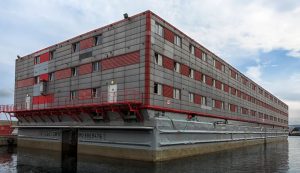Legionella detected on asylum seeker barge
 Britain’s controversial plan to house asylum seekers on a barge moored off the south coast of England has hit another snag after authorities were forced to evacuate the first residents when legionella bacteria were discovered in the barge’s water system.
Britain’s controversial plan to house asylum seekers on a barge moored off the south coast of England has hit another snag after authorities were forced to evacuate the first residents when legionella bacteria were discovered in the barge’s water system.
The drama came just days after the first men were moved onto the Bibby Stockholm, a floating hostel that can accommodate up to 500 people, as part of a government effort to cut the cost of housing the growing number of people applying for asylum in Britain.
“As a precautionary measure, all 39 asylum seekers who arrived on the vessel this week are being disembarked while further assessments are undertaken,’’ the Home Office, which oversees immigration issues, said in a statement.
“No individuals on board have presented with symptoms of legionnaires’ (disease), and asylum seekers are being provided with appropriate advice and support.”
Legionnaires’ disease is a serious respiratory infection caused when people inhale tiny water droplets containing the bacteria. It is not transmitted person-to-person, but is found in the cooling systems of large buildings and water lines that are not in regular use.
The legionella scare came after it was revealed that asylum seekers have were told that moving on to the Bibby Stockholm barge was “not a choice” and those who refused would no longer receive government support.
The first group to board the barge were given a deadline to comply or their housing assistance could be withdrawn.
UK Treasury minister Andrew Griffiths said they would “effectively take themselves out of the asylum support system”.
But refugee advocacy groups says the accommodation is akin to a prison.
The charity group Care4Calais charity said: “Housing people fleeing threats and persecution on an overcrowded barge is appalling, and in itself likely to cause extreme distress”.
“These are people who have endured horrific and often life-threatening journeys; being trapped in small, cell-like rooms behind the high metal fences will induce fear, anxiety and panic.” it said.
The 222-room, three-storey barge has been chartered by the UK government to reduce what it says is the $12 million a day cost of placing asylum seekers in hotels.
There were plans to put up to 500 asylum seekers aboard the barge, despite safety warnings about narrow exits and possible overcrowding.
The barge has catering facilities, a TV room, a multi-faith prayer room and a gym.
Migrants will be free to come and go and hourly buses to Weymouth and Portland are available.
The Home Office has said the barge occupants will undergo security screening and local police have said they do not expect any impact on the local community.












